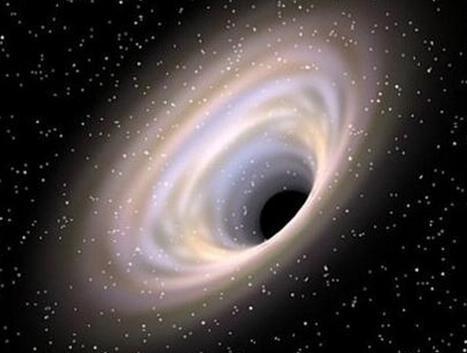There's nothing quite like staring into a celestial abyss to put your life in perspective. Perhaps that's what we all need in 2020.
没有什么能比得上凝视深邃的天空正视自己的人生,这可能就是2020年我们所有人需要做的。
On the brink of a new year, NASA's Hubble Space Telescope snapped a swirling mass of star dust and gas, known as spiral galaxy ESO 021-G004, and the resulting image is so gob-smacking, it's an instant reminder of how tiny and fragile our home really is.
新年伊始,NASA的哈勃太空望远镜拍到了一团旋转的星尘和气体,被称为螺旋星系ESO 021-G004,捕捉到的图像令人震惊,提醒着我们地球其实是多么渺小和脆弱。
Following its halo of illuminated cosmic matter, this neighbouring galaxy draws the eye inward toward a supermassive black hole lurking within. While most black holes are quiet and invisible, this one is wide awake, and scientists say its insatiable appetite is what makes the galaxy's centre burn so bright.
这一邻近星系被明亮的宇宙物质构成的光晕围绕,我们的目光被吸引到了它的内部,那里潜伏着超大质量黑洞。虽然大多数黑洞安静无形,但这个黑洞很亮,科学家说它吸入的东西太多,所以星系中心被烧得如此明亮。

As cosmic material falls back into the hole, pulled by gravity, it is dragged into orbit, superheated and eventually devoured, emitting a ton of high-energy radiation in the process.
宇宙物质受重力影响落回黑洞,被拖进轨道,由于温度过热最终被吞噬,整个过程会释放一吨的高能辐射。
This is what's known as an active galactic nucleus, and some consider it the strongest proof for the existence of supermassive black holes.
这就是所谓的活动星系核,有些人认为这是超大质量黑洞存在的最有力的证据。
Lucky for us, ESO 021-G004 resides a relatively nearby 130 million light-years away, in the small southern constellation of Chamaeleon, which makes it easier for us to keep our eyes on.
我们很幸运,ESO 021-G004距离我们约1.3亿光年远,位于南方的小星座蝘蜓座,所以我们更容易观测。













